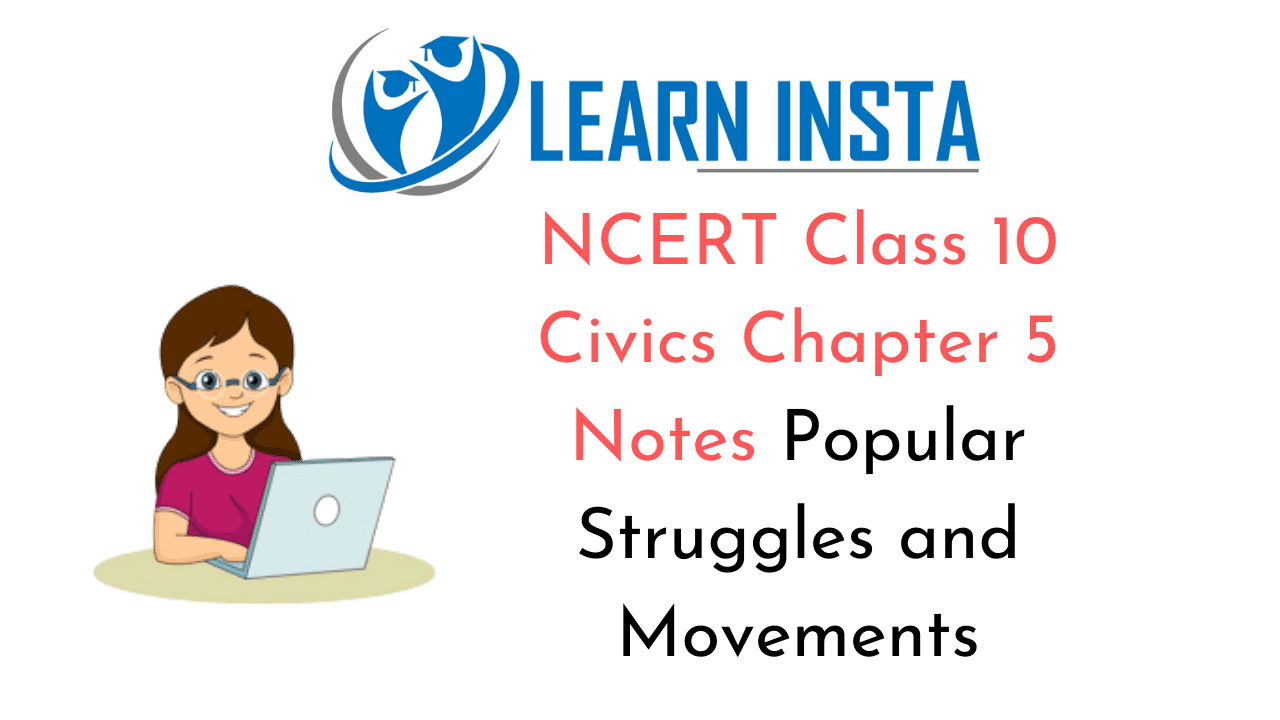 On this page, you will find NCERT Class 10 Civics Chapter 5 Notes Pdf free download. CBSE Class 10 Social Science Notes Civics Chapter 5 SST Popular Struggles and Movements will seemingly, help them to revise the important concepts in less time.
On this page, you will find NCERT Class 10 Civics Chapter 5 Notes Pdf free download. CBSE Class 10 Social Science Notes Civics Chapter 5 SST Popular Struggles and Movements will seemingly, help them to revise the important concepts in less time.
Popular Struggles and Movements Class 10 Notes Social Science Civics Chapter 5
CBSE Class 10 Civics Chapter 5 Notes Understanding the Lesson
1. Power-sharing is important in a democracy and different tiers of government and various social groups share power. Those who exercise power are constrained by the influence and pressure exerted on them.
2. Democracy involves conflict of interests and viewpoints. These differences are often expressed in organized ways. Those who are in power are required to balance these conflicting demands and pressures.
3. Struggles around conflicting demands and pressures shape democracy. Various pressure groups and movements influence politics using indirect ways.
4. The popular struggles in Nepal and Bolivia are two examples in this regard which were made successful with the help of organizations like Seven Party Alliance (SPA) and FEDECOR respectively.
5. The movement in Nepal was to establish democracy while the struggle in Bolivia involved claims on an elected, democratic government. Both these struggles were successful but their impact was at different levels.
6. There are many indirect ways in which people can get governments to listen to their demands or their points of view. They could do so by forming an organization and undertaking activities to promote their interests or their viewpoints. These are called interest groups or pressure groups.
7. Pressure groups influence government policies. They do not aim to directly control or share political power.
8. Movements too attempt to influence politics rather than directly take part in electoral competition; for example, Narmada Bachao Andolan, Movement for Right to Information, etc.
9. Interest groups seek to promote the interests of a particular section or group of society; for example, Trade Unions, Business Associations, etc. Their chief concern is the betterment and well-being of their members, not society in general.
10. Narmade Bachao Andolan is a good example of a single-issue movement. It can be contrasted with movements like environmental movement and women’s movement that are long term and involve more than one issue.
11. Pressure groups and movements exert influence on politics in a variety of ways-by carrying out information campaigns, organizing meetings, filing petitions, etc. They also organise protest activity like strikes or disrupting government programmes.
Note: Please note as per the CBSE curriculum 2017-18, chapter-5 has to be done as project work only and will not be evaluated in theory.
Popular Struggles and Movements Class 10 CBSE Notes Important Terms
Maoists: Those communists who believe in the ideology of Mao, the leader of the Chinese Revolution. They seek to overthrow the government through an armed revolution so as to establish the rule of the peasants and workers.
Ultimatum: A final demand, with a threat of hostile action if this is rejected.
Mobilisation: Act of marshalling and organising and making ready for use or action.
Pressure group: A group of people having common interests which exert pressure on the government for fulfilment of their interests.
Movement: A loose organisation which depends on spontaneous mass participation.